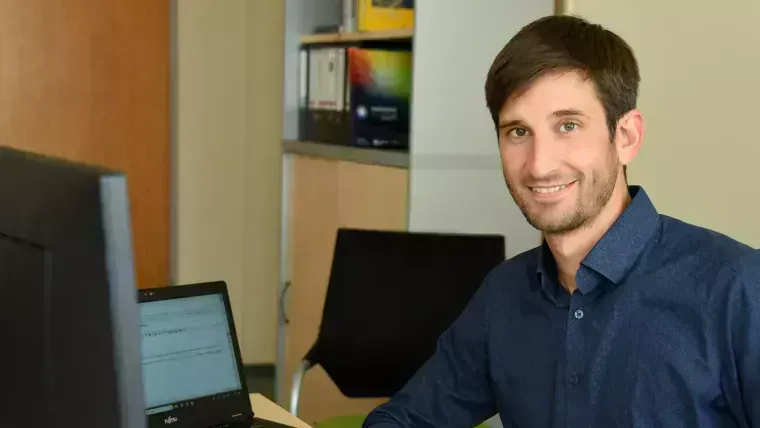
- Light
Published: | By: Laura Weißert, English translation by Gleb Chupakhin
Source article
Read the original article here (in German) de
“Quantum mechanics is different from what we encounter in day-to-day life and difficult to describe mathematically”, says Prof. Dr. Martin Gärttner. “If we want to simulate quantum systems with many particles using a computer, then it is more difficult compared to classical systems – and this hinders us in understanding some phenomena that occur in solid state or high-energy physics, for example.” To investigate quantum systems that can be explored in the laboratory or simulated on a computer only to a limited extent, quantum simulation is needed. And that is exactly what Gärttner has been working on since becoming a Professor of Quantum Information Theory (tenure-track) as well as Principal Scientist of the Abbe Center of Photonics in September 2023 at the University of Jena.
"The idea is to recreate quantum systems in the laboratory within a controlled environment and then to use this quantum experiment practically as a simulator instead of a classical computer," explains the physicist. As a theorist, Gärttner is primarily interested in the quantum information-theoretical fundamentals; the experimental work is ultimately left to others. He sees his role in finding methods to better understand quantum simulators and to make them more efficient.
Even though he is at home in fundamental research, not only pure curiosity and the joy of discovering new things or expanding theories drive Martin Gärttner: "For me, it's also motivating to know that I'm working on a topic that has implications for socially relevant technology—even if I'm not personally making a 'hands-on' contribution to it." Applications that can be improved through quantum effects include cryptography, sensing, or imaging. "A big topic, of course, is quantum computing. “There are efforts to build quantum computers with photons here in Jena and elsewhere”, says Gärttner. "But for all platforms for quantum computing, there are technical obstacles that still need to be overcome—so there is still much work to be done."
Jena as a New Home
The 38-year-old, originally from near Heilbronn, is excited to continue his research at Friedrich Schiller University. "There are so many young people here doing great things, and there's so much happening, especially in the field of quantum technology." Gärttner’s research group has followed him to Jena from the University of Heidelberg, where Gärttner established it. He studied physics and later earned his doctorate there, but also gained international experience. After completing his studies, including a semester abroad in Melbourne, Australia, Gärttner conducted research in Granada, Spain. After his Ph.D., Gärttner spent over two years as a postdoc at the JILA research institute in Boulder, USA, before returning to his alma mater in 2017. "Heidelberg was always my home base—now it's Jena."
The offer from Friedrich Schiller University came at exactly the right time, says Martin Gärttner. Here, the father of two has the long-term perspective he desired. "Science is indeed a pyramidal system, and not everyone ends up getting a professorship. I also had phases where I doubted whether I wanted to continue," he recalls. He is all the more happy to be in Jena now, where he would like to contribute to establishing a center of excellence for quantum information. Additionally, there are efforts at the University of Jena to establish a program for quantum technology. "If that succeeds, I naturally want to be involved by developing and conducting relevant lectures."
Inspiring Student Research
In his lectures, Gärttner places particular emphasis on research-oriented learning by embedding exercise tasks in the context of current research. "That motivates because then you know why you're learning something and what it's good for." The small programming exercises integrated into the lectures are also well-received by students. Instead of a 90-minute chalkboard lecture, he aims to encourage active participation from attendees. It helps that the Faculty of Physics and Astronomy in Jena is considerably smaller than the one in Heidelberg. "It's admittedly an adjustment, but it's fun to work with a smaller group—you can address individuals in a completely different way."
Gärttner and his family have settled into Jena well. The 38-year-old prefers to spend his free time outdoors jogging or cycling. There's just one thing he misses in the city by the Saale River: "I'm a mountain person—unfortunately, I'm now a bit too far away from the Alps. But around Jena, there are also beautiful hiking opportunities."